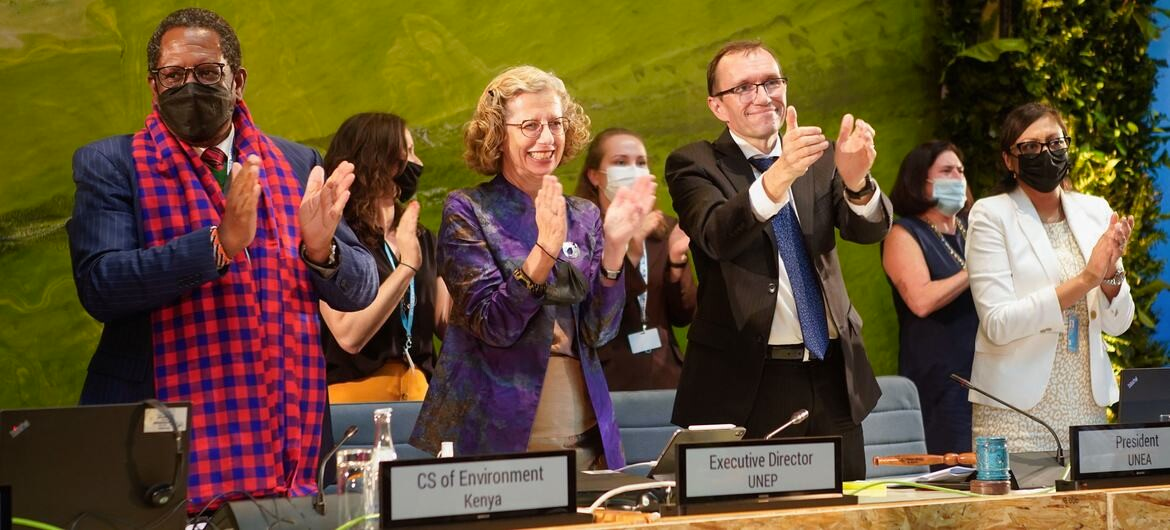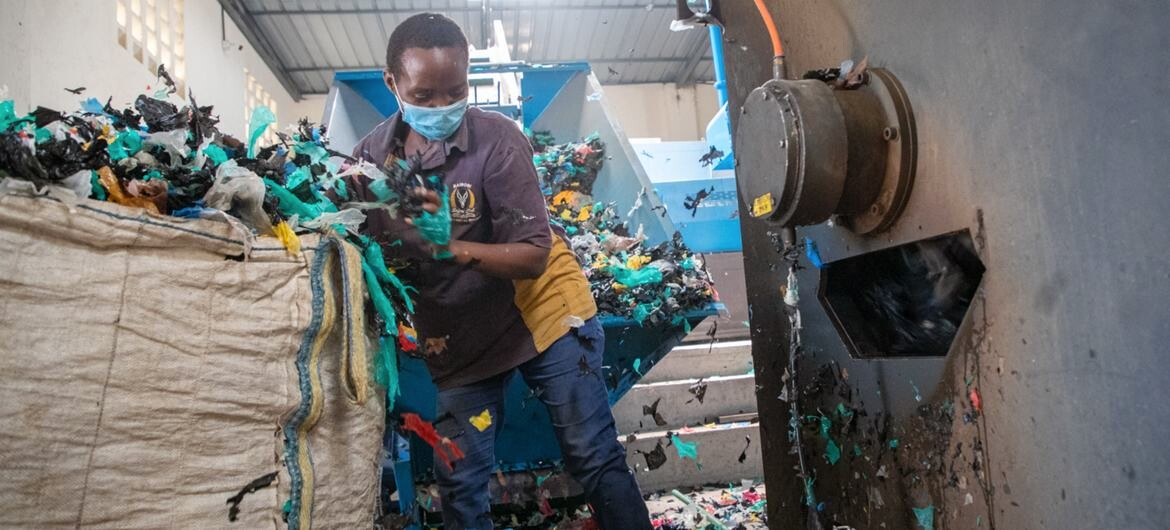Fixing the Plastic Pollution Problem: Implications for Africa


· 5 min read
One of my favourite African proverbs reminds us that “once you carry your water, you’ll remember every drop”. In context, the globe is under the weight of diverse environmental challenges that threaten human and economic development towards realising the Sustainable Development Goals (SDGs) and recovery from the COVID-19 emergency. An estimated 11 million tonnes of plastic waste flow into the ocean every year as I pen this article. By 2025, 100 million to 250 million metric tons of plastic waste could enter the sea each year. Between 2021 and 2040, the cumulative cost of managing plastic waste is estimated to be US$670 billion. If we fail to take action, this inaction will pose a financial risk to economies and businesses across the globe, estimated at $100billion every year by 2040. These costs manifest as damage to livelihoods and key economic industries such as fishing and tourism, clean-up costs and threats to the health of the populations. On March 2, 2022, representatives from 175 nations worldwide took a historic step toward ending pollution. The United Nations Environment Assembly voted to task a committee for forging a legally binding global treaty on plastic pollution by 2024.

One insightful African proverb reminds us – that “the one with eyes is not told to look”. Just consider this – the chemicals in plastic have been associated with severe health problems like hormone-related cancers, infertility, neurodevelopment disorders, among others. The plastic production process exposes communities to over 170 toxic chemicals – with children being most vulnerable. Combining the production and waste incineration of plastics is projected to emit the equivalent of 615 coal plants by 2050 to escalate climate change further.

All these risks notwithstanding, the global plastic market continues to grow. It was valued at $579.7billion in 2020 and projected to grow at a compound annual rate of 3.4% up to 2028. What the globe then needs to do is to prevent the release of all these plastics into the environment where they cause harm to human & environmental health and maintain them more in the production cycle – what we call a circular economy. Currently, less than 10% of all plastic waste globally is recycled. In Africa, the figure is much lower at about 4%. Recycling these plastics portends between $80 – 120billion in income, enterprise, and economic growth opportunities globally through the packaging industry alone.
The treaty in question comes to put in place a regulatory framework to actualise this much-needed circularity. It establishes an intergovernmental negotiating committee (INC) with a mandate to negotiate a legally binding global agreement to address plastic pollution towards reducing the discharge of plastics into the environment by covering all stages of the plastic life cycle and adopting a circular economy approach to plastics. It provides a legal & policy framework within which investments in recycling and other techniques towards beating plastic pollution can be prioritised across the globe. A key attribute is that the resolution is “international” or “transboundary”. This is very important to note because plastic waste is transboundary. Plastic litter knows no boundaries. When realised in the coastlines of one country, it ends up causing effects on the shores of neighbouring countries and globally.
It means one thing – “alternative opportunities”. Recycling alone portends up to $120 billion in enterprise opportunities globally. Reusing & recycling also generates energy savings – estimated up to 87%. Those making plastics should now diversify towards recycling to tap these opportunities. In addition, as more countries put forward commitments to minimise emissions in line with the net-zero targets of 2050, carbon taxes are beginning to take effect, and plastics will be one of the areas most targeted, considering that they are projected to contribute up to 20% of emissions. Incorporating measures that reduce the sting of plastics – such as recycling & reuse – will go a long way in reducing their carbon tax liabilities.
This resolution portends opportunities for enterprises that provide alternatives to plastics and those that enhance circularity in plastics – especially for the youth who are already showing their innovativeness.
We already see examples of such enterprises at play in Africa. For instance,Leveraging on Innovative Volunteerism skills retooling Adejoke Lasisi is turning Waste To Wealth driving sustainable fashion. They source plastic bags and weave them into fabricated materials.

Leveraging on the spirit of Innovative Volunteerism, young people collect waste from the streets and build the capacity of other youth by training them to turn plastic waste into bricks, tiles etc. Waste To Wealth Climate Action. They are recycling plastic waste into paving tiles. These have proven to be up to 30% cheaper than conventional concrete blocks and five to seven times stronger than concrete while being much more affordable to transport.

Africa suffers from plastics released elsewhere, while others suffer from the plastic released in Africa. The entire continent generates just about 16.25million tonnes of plastic waste, against a global total of over a 242million tonnes. This then means Africa is among regions that urgently needs investments in the circularity in plastic waste enhanced. Currently, only 4% of all waste in Africa is recycled against a target of 50% by 2023 set by the AU Agenda 2063. In one country alone, plastic recycling has created over 4000 direct jobs and over 30,000 indirect jobs, and this has added over $16million directly into people’s pockets through the payroll. Therefore, the point is that Africa urgently needs to embrace circularity in plastic waste to reduce the amounts that end up in oceans and reap benefits.
Incentives such as tax breaks, incentivising financiers to prioritise investments in plastic recycling, reskilling & training, and business incubation will go a long way to catalyse the growth of local enterprises engaged in recycling, which is a formidable strategy for circularity in plastics.
Energy Voices is a democratic space presenting the thoughts and opinions of leading Energy & Sustainability writers, their opinions do not necessarily represent those of illuminem.
illuminem briefings

Mitigation · Climate Change
illuminem briefings

Climate Change · Environmental Sustainability
Charlene Norman

Sustainable Business · Sustainable Finance
The Washington Post

Mitigation · Climate Change
Politico

Climate Change · Environmental Rights
The Guardian

Pollution · Nature